Flavor Texture

How can I tell if my shrimp is cooked properly ?
Cooking shrimp perfectly requires attention to color, texture, curvature, and flavor. Look for an opaque white color, firm but not hard texture, slight "C" shape curvature, and a clean, sweet flavor without fishiness. Use a thermometer, watch the timing closely, choose the right cooking method, and practice regularly to achieve culinary perfection with your shrimp dishes.

How do I get that restaurant-quality flavor in my homemade crab cakes ?
How to Achieve Restaurant-Quality Flavor in Homemade Crab Cakes: - Freshness and quality of ingredients are crucial. - Lump crabmeat is preferred for its sweet flavor and good texture. - Use a combination of seasonings like Old Bay, mustard, Worcestershire sauce, and hot sauce. - Bind the mixture with mayonnaise or mustard lightly. - Pan-fry or oven-bake the crab cakes for different textures. - Serve with remoulade sauce and sides like green salad or roasted vegetables. - Allow the crab cakes to rest before cooking and avoid overcrowding the pan.

How can I make my favorite dishes vegetarian without sacrificing flavor ?
How to Make Your Favorite Dishes Vegetarian Without Sacrificing Flavor

How can I make my breakfast more colorful and visually appealing ?
How to Make Your Breakfast More Colorful and Visually Appealing: 1. Use fresh fruits and vegetables for color and nutrition. 2. Experiment with different grains and breads for texture and color. 3. Add spices and herbs for flavor and color. 4. Get creative with plating for visual appeal. 5. Incorporate edible flowers for beauty and flavor.
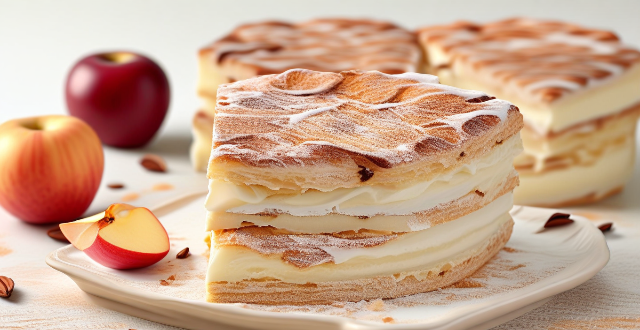
What are some tips for making vegan desserts that everyone will love ?
To make vegan desserts that everyone will love, consider these tips: use natural sweeteners like maple syrup and agave nectar for rich flavor; incorporate nut butters such as almond and cashew for creaminess; experiment with flours like almond and oat for baking; add spices and extracts like vanilla and cinnamon for depth of flavor; utilize fruits like apples and bananas for natural sweetness; use dairy substitutes like coconut milk and almond milk for creamy textures; get creative with chocolate by using vegan brands or carob; and focus on texture by adding nuts, seeds, and dried fruits. By following these guidelines, you can create desserts that are not only vegan but also deliciously satisfying.

How can I make sure my paella has the right consistency and flavor ?
To ensure your paella has the right consistency and flavor, choose short-grain rice like Bomba or Calasparra, use fresh proteins and quality vegetables, cook with proper techniques including sofrito caramelization and correct liquid ratios, season well with salt and additional spices, let it rest before serving, and garnish with lemon wedges and parsley.

What are some gluten-free breakfast options that don't sacrifice flavor ?
Gluten-Free Breakfast Options that Don't Sacrifice Flavor: Gluten-free pancakes, oatmeal with fruits and nuts, egg dishes, smoothies, gluten-free cereals, and breads are all delicious and healthy breakfast options for those who are gluten-free.
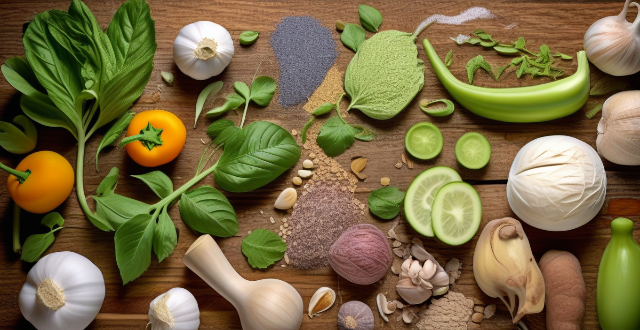
What ingredients are commonly used in Mexican cooking to create its unique flavor profile ?
The article provides an overview of the key ingredients used in Mexican cooking, including chili peppers like ancho, jalapeño, serrano, and habanero; herbs and spices such as cumin, coriander, oregano, and cilantro; and other ingredients like tomatoes, onions, garlic, lime juice, epazote, and hominy. It explains how these ingredients contribute to the distinctive flavor profile of Mexican cuisine and encourages readers to experiment with creating authentic Mexican meals at home.
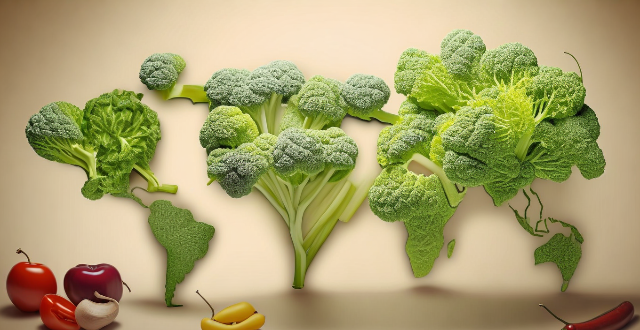
What role does cilantro play in Mexican cuisine in terms of flavor ?
Cilantro is a key herb in Mexican cuisine, adding flavor, aroma, and freshness to dishes. Its unique taste, described as citrusy, grassy, and slightly peppery, complements the bold and spicy flavors of Mexican cooking. Cilantro is used in salsas and guacamole, soups and stews, marinades and rubs, tacos and enchiladas. Its citrusy notes cut through rich ingredients, grassy undertones provide a refreshing contrast, and its peppery bite adds complexity. Cilantro is essential for enhancing the taste and aroma of Mexican dishes.

How can I make drinks look more appealing with garnishes ?
Garnishing drinks is an art form that can elevate the visual appeal of your beverages. It not only enhances the aesthetic but also adds flavor and aroma to your drink. In this guide, we will explore various techniques and ideas to make your drinks look more appealing with garnishes. Importance of Garnishes: Garnishes add visual appeal, enhance flavor and aroma, and create theme and ambiance. Garnish Ideas: Fruit garnishes like slices and wedges, herb garnishes like sprigs and leafy toppers, spice garnishes like cinnamon sticks and star anise, edible flowers such as pansy or viola, and miscellaneous garnishes like cocktail picks and salt rims. Techniques for Applying Garnishes: Rim treatments like wet rims and layered effects, floating garnishes like fruit slices and edible flowers, and skewered garnishes like combination skewers and visual balance. By incorporating various types of garnishes and employing different techniques, you can significantly enhance the visual appeal of your drinks. Remember to consider factors such as color, texture, and flavor when selecting garnishes to create a cohesive and attractive presentation. With these tips, you'll be able to elevate any beverage from ordinary to extraordinary in no time!
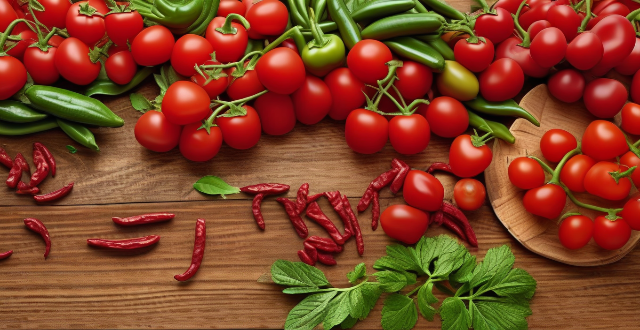
What are some traditional Mexican flavors ?
Mexican cuisine is known for its bold and vibrant flavors, which are a result of the country's rich history and diverse cultural influences. Some of the most traditional Mexican flavors include chili peppers, herbs and spices, fruits and vegetables, dairy products, and meats and seafood. These flavors come together to create the vibrant and delicious cuisine that Mexico is known for.

How do I properly season my stir-fry dishes ?
When it comes to stir-fry dishes, seasoning is key to achieving that perfect balance of flavors. Here are some tips on how to properly season your stir-fry dishes: 1. Choose the right ingredients: Select fresh vegetables and proteins that will complement each other in terms of flavor and texture. 2. Use a variety of sauces and spices: Experiment with different sauces and spices to find the perfect combination for your dish. 3. Balance sweet, sour, salty, and spicy flavors: A good stir-fry should have a balance of these four flavors. 4. Cook in batches and use high heat: Cook your ingredients in batches over high heat to ensure even cooking and maximum flavor. 5. Taste and adjust as needed: Taste your stir-fry as you go and adjust the seasoning as needed.

How do you describe the taste of authentic Mexican cuisine ?
Mexican cuisine is a vibrant and complex blend of flavors that can be both bold and subtle. Here are some key characteristics that describe the taste of authentic Mexican food: ### Spicy Heat Chili peppers and spices like cumin, oregano, and cinnamon add depth of flavor to many dishes. ### Acidity and Tanginess Lime juice and tomatoes provide refreshing acidity and tanginess, while also contributing sweetness. ### Earthy and Nutty Flavors Beans, corn, and nuts offer earthy undertones and richness to Mexican cooking. ### Sweetness and Fruitiness Fruits such as pineapple and mango, as well as vegetables like sweet potatoes, bring a touch of sweetness to savory dishes. ### Umami Richness Cheese and slow-cooked meats contribute deep, savory flavors to Mexican cuisine. ### Herbaceous Notes Cilantro and epazote provide distinctive, fresh flavors that are essential in traditional cooking. ### Texture Variety Crunchy vegetables and creamy avocado-based sauces offer a range of textures that balance spicier elements. ### Bold and Aromatic Garnishes Onions and cilantro are often used as garnishes, adding sharpness and freshness to dishes. Overall, authentic Mexican cuisine is a harmonious combination of spicy, tangy, sweet, umami, herbaceous, and textural elements that create a complex and satisfying gustatory experience.

What makes the flavor of street tacos in Mexico different from those found elsewhere ?
The flavor of street tacos in Mexico differs from others due to authentic ingredients, traditional cooking methods, regional specialties, vibrant street food culture, and a variety of condiments.
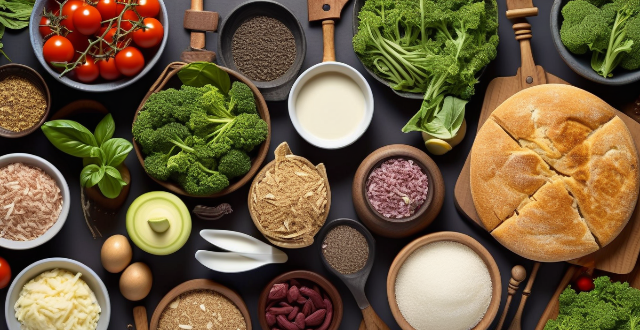
How can I spice up my usual home-cooked meals with new flavors ?
To spice up your usual home-cooked meals, try using fresh herbs and spices, exploring global flavors, incorporating acids and sweetness, and adding textures and garnishes.
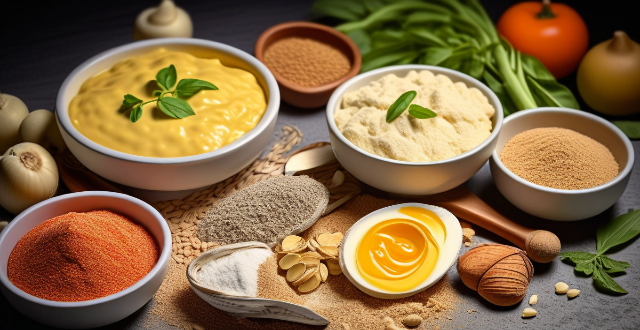
What are the key ingredients in Indian cooking ?
Indian cuisine is known for its rich flavors and diverse dishes. The key ingredients that make Indian cooking unique are spices, herbs, ghee, lentils, rice, yogurt, nuts and seeds, and bread. These ingredients add flavor, color, and aroma to the dishes and create authentic and delicious Indian cuisine.

How do I prepare a perfect grilled fish ?
Grilling fish is a delightful culinary experience that can be perfected with the right preparation and process. Here's a step-by-step guide to help you achieve perfection every time you fire up the grill for your favorite fish: 1. **Preparation** - **Choosing the Right Fish**: Opt for fresh fish, aim for fillets that are at least 1-inch thick, and choose types of fish like salmon, sea bass, and swordfish that are great for grilling due to their natural fat content. - **Marination**: Decide on the flavor profile you want, marinate the fish for at least 30 minutes to an hour in the refrigerator, but be cautious not to leave it too long as the acid in the marinade can start to cook the fish. - **Grill Prep**: Ensure your grill is clean to avoid any unwanted flavors and lightly oil the grates to prevent sticking. 2. **Grilling Process** - **Preheating the Grill**: Preheat the grill to medium-high heat, ideal temperature range between 375°F to 450°F (190°C to 230°C). - **Cooking the Fish**: Place the fish skin side down on the grill, flip the fish only once, and use a wide spatula to carefully flip and remove the fish without breaking it. - **Checking for Doneness**: The flesh should turn from translucent to opaque and give a gentle poke; it should flake easily with a fork. 3. **Serving Suggestions** - **Lemon Wedges**: Serve with wedges of lemon to add a fresh citrus note. - **Herb Sauce**: Pair with a simple herb sauce or compound butter. - **Side Dishes**: Consider serving with grilled vegetables, a fresh salad, or roasted potatoes. By following these steps, you will be able to prepare a perfect grilled fish that is sure to impress your guests or simply satisfy your own cravings for a delicious meal. Enjoy the process and savor the flavor!

What kind of chocolate is typically used in French chocolate desserts ?
The article discusses the importance of chocolate selection in French chocolate desserts, highlighting the use of dark, milk, white, and unsweetened chocolate. It emphasizes the rich culinary heritage of France that demands quality ingredients, especially in chocolate desserts. The article also suggests considering the desired outcome of the dish, taste testing, and experimentation to find the perfect chocolate for a particular dessert.

What are the most common ingredients used in gluten-free baking ?
Gluten-free baking is a method of preparing baked goods without using wheat flour or other sources of gluten. Here are the most common ingredients used in gluten-free baking: Flours and Starches: Rice Flour, Almond Flour, Potato Starch, Tapioca Flour, Cornstarch Binding Agents: Xanthan Gum, Guar Gum, Eggs Sweeteners: Honey, Maple Syrup, Stevia Fats and Oils: Butter, Coconut Oil, Olive Oil

What are some unique ingredients commonly used in French desserts ?
French desserts are renowned for their exquisite taste and delicate textures, which are largely due to the unique ingredients used in their preparation. These include vanilla beans, almond meal, cream, butter, lemon zest, and kirsch. Each ingredient plays a crucial role in enhancing the flavor, aroma, and texture of French desserts. Understanding the importance and usage of these ingredients can help you appreciate the artistry behind French pastry making and even try your hand at creating your own delectable treats.
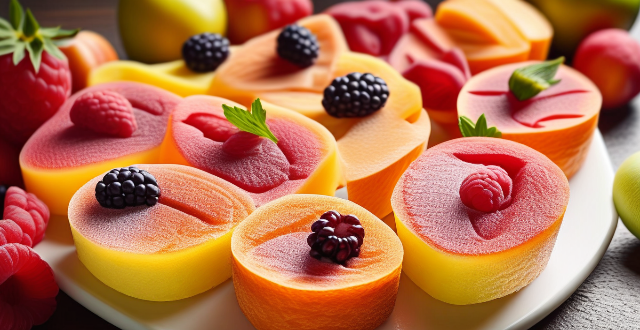
How does a traditional tarte Tatin differ from other fruit tarts ?
Tarte Tatin is a classic French dessert that differs from other fruit tarts in several ways. It is prepared by cooking the fruits first, which releases their natural juices and creates a rich, syrupy filling. The tart is then baked upside down, resulting in a beautiful presentation with caramelized fruits on top and a flaky crust on the bottom. The flavor profile of Tarte Tatin is also unique, with deep, complex flavors created by the caramelization process and a buttery crust that absorbs some of the fruit flavors. Finally, the texture of Tarte Tatin is delicate and moist, with a flaky crust and juicy fruits that create a satisfying contrast. Overall, Tarte Tatin stands out as a delicious and visually stunning dessert that is sure to delight anyone who tries it.

Why is temperature control important in food storage and preparation ?
Temperature control is crucial in food storage and preparation to ensure safety, quality, and longevity of food products. It prevents bacterial growth, avoids toxin production, maintains flavor and texture, preserves nutrients, extends shelf life, reduces waste, saves energy, and reduces environmental impact. Proper temperature control helps to enjoy delicious and healthy meals while minimizing the risk of foodborne illnesses and food waste.
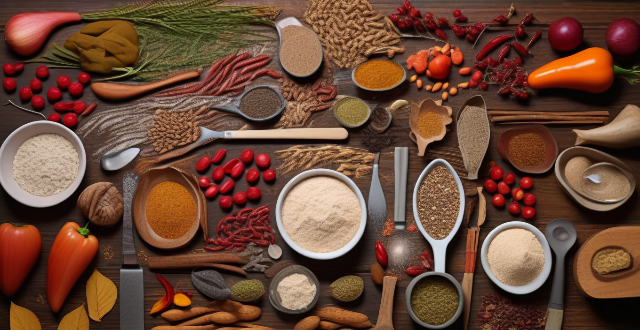
What is the significance of spices in Indian cooking ?
The significance of spices in Indian cooking is multifaceted, encompassing flavor enhancement, cultural traditions, and medicinal benefits. Key spices like turmeric, cumin, coriander, mustard seeds, fenugreek, red chili powder, garam masala, curry leaves, asafoetida, and tamarind contribute to the complex flavor profiles characteristic of Indian cuisine. These spices are used through techniques such as tempering, grinding, and roasting to create a balance of tastes and visual appeal. Historically, spices were valuable commodities in trade and are integral to traditional medicine and religious practices. Regional variations in spice use reflect India's diverse geography and cultural heritage. Understanding the nuances of spice usage allows for a deeper appreciation of the artistry behind Indian dishes.

What is the significance of lime and avocado in enhancing Mexican culinary flavors ?
Mexican cuisine is renowned for its vibrant colors and bold flavors, with lime and avocado playing pivotal roles in enhancing these characteristics. Lime adds acidity and brightness, balancing rich ingredients and acting as a marinade or garnish. Avocado contributes creaminess and nutrition, offering versatility in both sweet and savory dishes. Together, they create harmonious blends like guacamole and tacos al pastor, enriching the culinary experience and reflecting Mexican cooking traditions' emphasis on freshness and balance.

What are some tips for balancing sweet and sour flavors in cocktails ?
"Balancing Sweet and Sour Flavors in Cocktails: Tips and Tricks for Crafting Perfect Drinks"

How can I use bitters to enhance my cocktail recipes ?
Bitters are a crucial ingredient in many cocktails, adding depth and complexity to the flavors. Here's how you can use them to enhance your cocktail recipes: Understanding Bitters: Bitters are concentrated alcoholic extracts made from herbs, spices, fruits, and other botanicals. They are typically used in small amounts to add a subtle, aromatic flavor to cocktails. There are several types of bitters available, each with its own unique flavor profile. Using Bitters in Cocktails: Here are some tips for using bitters in your cocktail recipes: start small, experiment with flavor combinations, use as a garnish, and create your own bitters. Overall, using bitters is an easy way to elevate your cocktail game and create unique, complex flavors that will impress your guests.
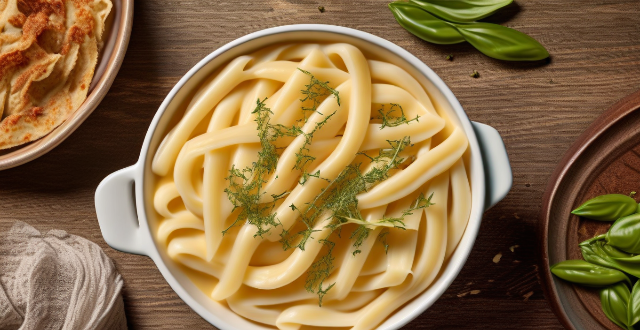
How do I make a creamy pasta sauce without using heavy cream ?
To make a creamy pasta sauce without using heavy cream, start by sautéing aromatics like onions and garlic in olive oil. Then, add vegetable or chicken broth and unsweetened non-dairy milk to the pan. Thicken the mixture with a flour slurry and season it with Dijon mustard, salt, and pepper. Finally, toss the creamy sauce with your cooked pasta for a delicious dairy-free meal.

What are the most common mistakes when cooking lobster at home ?
Cooking lobster at home can be delightful but common mistakes can affect taste and texture. Here are the most frequent errors: 1. **Not Preparing the Lobster Properly** - Underestimating the amount of salt needed for cooking water. - Ignoring the rinse before cooking to remove sand or grit. 2. **Overcooking the Lobster** - Cooking too long results in tough and chewy lobster. - Lack of temperature control during cooking. 3. **Choosing the Wrong Lobster** - Selecting poor quality or lethargic lobsters. - Neglecting size variation leading to uneven cooking times. 4. **Disregarding Safety Precautions** - Handling live lobsters incorrectly, risking injury. - Ignoring cross-contamination with other foods. 5. **Inadequate Flavoring** - Skipping seasoning, missing out on enhancing natural sweetness. - Overlooking garnishes that can improve the dining experience. 6. **Improper Storage and Handling** - Storing improperly if not cooked immediately. - Delaying cooking after purchase, risking the quality of the lobster. By avoiding these mistakes, you can ensure that your homemade lobster dishes are delicious and succulent.
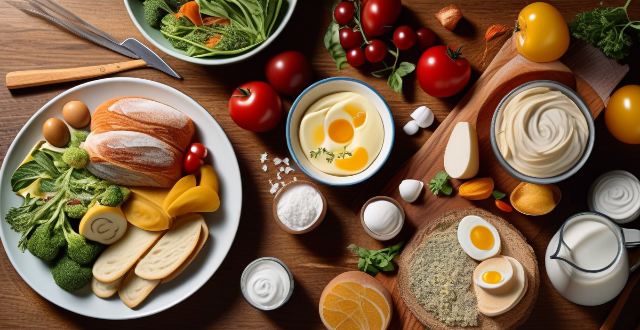
How can I incorporate more whole grains into my meals ?
Incorporating whole grains into meals is beneficial for health, providing fiber, vitamins, and minerals. Tips include starting with breakfast options like oatmeal and whole-grain bread, swapping refined grains for whole ones in cooking, adding them to salads and soups for texture and nutrition, snacking on popcorn or granola bars made with whole grains, and experimenting with various grains like quinoa and farro.